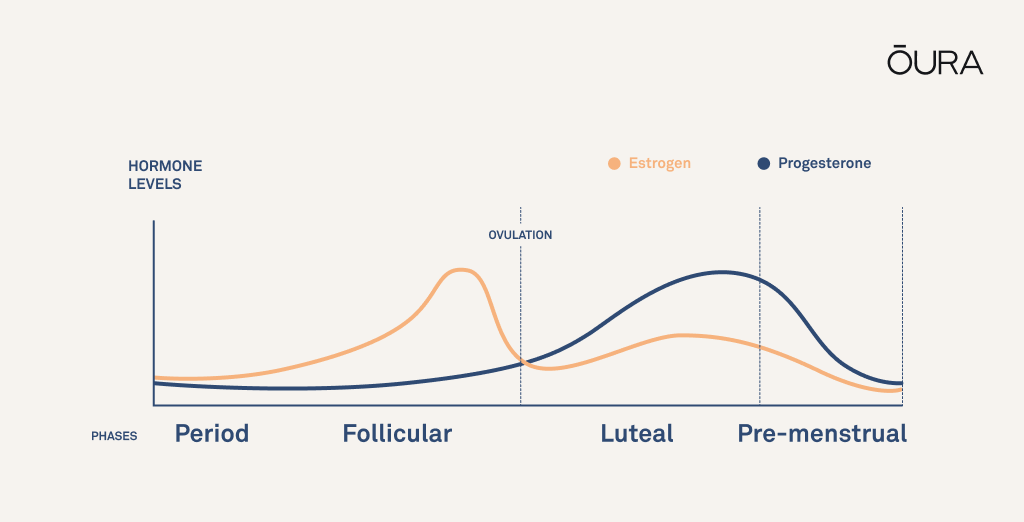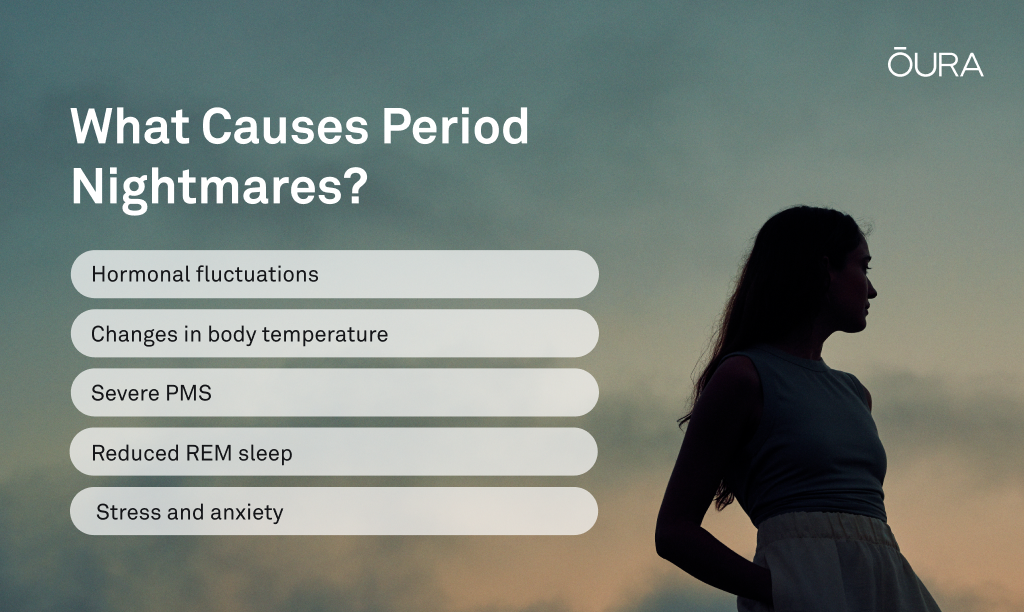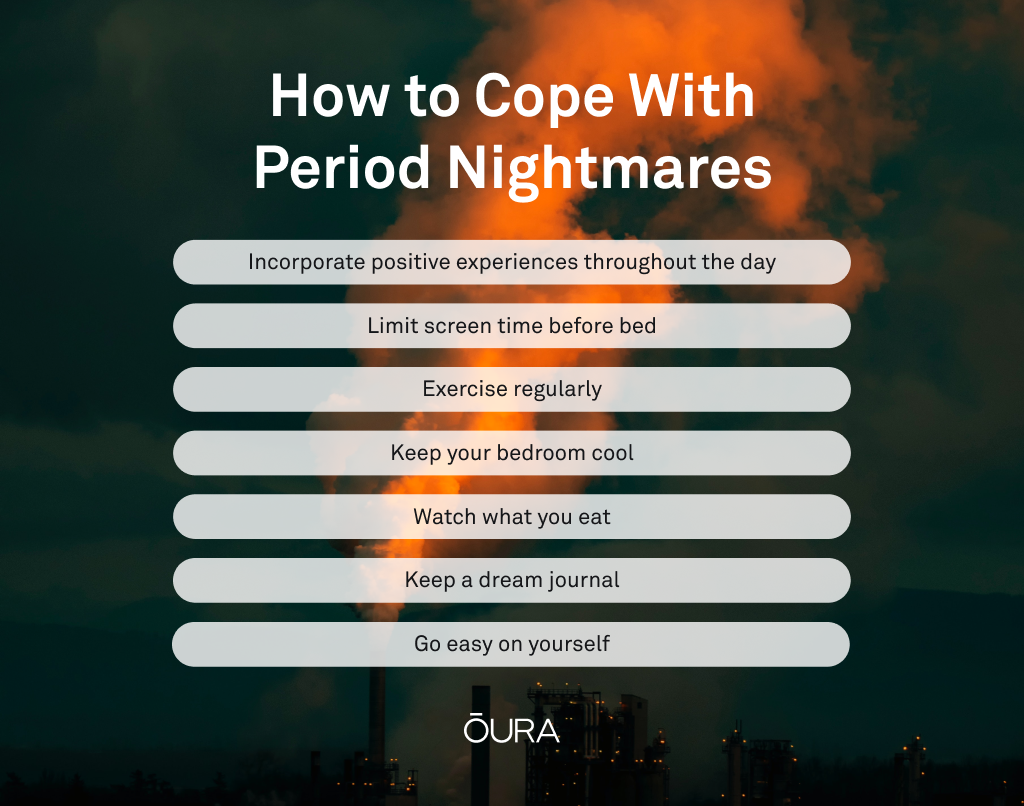You’re probably familiar with some of the most common PMS symptoms, such as low mood, irritability, bloating, and migraines. You may have even noticed sleep disturbances in the days leading up to your period. But could nightmares be linked to your menstrual cycle?
Potentially. According to research, period nightmares, sleep disorders and disturbances are common — even among women who don’t have any other menstrual-related complaints.
In fact, up to 7 in 10 women report changes to their sleep patterns before their period. Experts believe that many of the hormonal fluctuations that cause these disturbances may also be at the root of your period-related nightmares.
If you’re an Oura member, you can use the Cycle Insights feature to determine whether your nightmares coincide with your menstrual cycle or if there’s another reason behind them.
If period nightmares are keeping you up at night, read on for some suggestions on how to cope.
RELATED: Tired During Your Period? 5 Potential Reasons Why
Possible Causes of Period Nightmares
Several changes happen in your body in the days before and during your period that can contribute to nightmares. Here are some of the most likely culprits.
Hormonal Fluctuations
Throughout your menstrual cycle, your body is in constant flux, with hormone levels rising and falling at different times during the month.
After ovulation and before your period, in the phase known as the luteal phase, your estrogen levels drop. This affects the amount of the feel-good chemical serotonin in your brain and can lead to some women experiencing bad dreams.
RELATED: Busting the 14-Day Ovulation Myth
While your estrogen drops, progesterone levels steadily increase before sharply dropping right at the end of the cycle. Studies have shown that these increases in progesterone can lead to insomnia or sleep fragmentation, while other research indicates that poor sleep efficiency and nocturnal awakenings are both linked to nightmares.

Oura members can check their Sleep Score and sleep efficiency to determine whether poor sleep quality might be causing their nightmares.
Changes in Body Temperature
The increase in progesterone causes your body temperature to rise, which can lead to night sweats, hot flashes, and vivid dreams and nightmares.
If you’re an Oura member, you can track your body temperature trends throughout the month to see whether higher temperatures coincide with your nightmares.
READ MORE: Using Oura Temperature to Track Your Menstrual Cycle
Severe Premenstrual Syndrome (PMS)
One study of women with severe PMS found that they experienced more sleep disturbances and frequent nighttime awakenings compared to women with minimal symptoms.
The researchers found that these disturbances to the sleep cycle were accompanied by higher levels of anxiety and depression, which may also contribute to nightmares.
Use your Oura data to see whether frequent awakenings during the night might be causing you to have more nightmares than usual.
Reduced REM Sleep
Studies have shown that the progesterone spike you experience during the luteal phase is directly linked to less time spent in the rapid eye movement (REM) stage of sleep.
REM sleep is typically when most dreaming occurs, so when you combine shortened REM sleep cycles with more frequent nightly awakenings, you’re more likely to remember your nightmares. They may also occur during the rest of your cycle, but you might not always remember them.
If you’re an Oura member, you can check how much time you spend in REM sleep to see whether changing hormones might be reducing the amount of REM you get per night.
Stress and Anxiety
Stress and anxiety are two of the most common premenstrual symptoms, and are usually a result of the changing levels of estrogen and progesterone combined with the stressors of daily life. Additionally, women with mental health issues, such as anxiety and depression, may experience a worsening of their symptoms during this time.
Unfortunately, stress and anxiety can trigger nightmares, as can traumatic events like the death of a loved one.
Oura members can monitor their heart rate variability (HRV) to keep tabs on their stress levels throughout their monthly cycles. Stress decreases HRV, so if you notice your HRV dropping, you can take steps to manage your stress.

Period Nightmares: How to Cope
While having nightmares before or during your period is usually nothing to worry about, it can cause daytime sleepiness and affect your overall well-being. If period nightmares are interfering with your quality of life, try one or more of the following tips.
Incorporate Positive Experiences Throughout the Day
Dreams tend to reflect aspects of recent waking life experiences — therefore, it’s important to incorporate positive experiences into your daily life so you can experience them again when sleeping.
Even if you can’t control everything that happens during the day, cultivating positive experiences just before you go to bed may help ease your nightmares.
READ MORE: Use HRV to Manage Stress
Limit Screen Time Before Bed
Have you ever watched a movie or series at night, then gone to bed and continued the action in your sleep? Not only can the blue light affect melatonin production and disrupt your circadian rhythm and sleep cycles, but stressful plots and storylines can actually infiltrate your dreams.
Instead of staring at screens, engage in peaceful activities like reading, listening to music or green noise, yoga, breathing exercises, or meditation before bed. This may help prevent nightmares by alleviating stress and keeping your anxiety in check.
READ MORE: How Blue Light Impacts Your Sleep
Exercise Regularly
Exercise is a great stress reliever and can help improve sleep quality. It’s a good idea to aim for moderate exercise most days of the week, but avoid exercising close to bedtime, as this can actually interfere with your sleep.
READ MORE: How to Align Your Training With Your Menstrual Cycle
Keep Your Bedroom Cool
Your body temperature is one to two degrees lower at night than it is during the day. Therefore, keeping your bedroom cool at night may help reduce restlessness, promote relaxation, and reduce the frequency and severity of hot flashes. This can prevent sleep disturbances and reduce the likelihood of pre-period nightmares.
According to the National Sleep Foundation, the ideal nighttime temperature for your bedroom is 18.3 degrees Celsius (65 degrees Fahrenheit).
If you’re an Oura member, you can track your body temperature trends to see if higher premenstrual temperatures might be affecting your sleep and adjust your bedroom temperature accordingly.
RELATED: 5 Ways to Upgrade Your Sleep Hygiene
Watch What You Eat
Food cravings are another common PMS symptom and can lead to raiding the freezer for ice cream late at night and other less-than-ideal eating habits that can negatively affect your sleep.
Support your body by eating a balanced diet throughout your cycle and reducing caffeine and alcohol, especially during the days before your period starts.
READ MORE: Midnight Snack? Not So Fast
Keep a Dream Journal
If you think your dreams are trying to tell you something, try keeping a dream journal. Contrary to popular belief, dreams don’t always have a universal meaning — in fact, you are the most qualified person to interpret your dreams.
See if you can spot any themes, patterns, or triggers that may relate to everyday stresses in your life — if you can identify them, you’ll be one step closer to addressing them.
RELATED: Sweet Dreams: How Dreaming Can Help Lower Stress and Regulate Emotions
Go Easy on Yourself
Dreaming isn’t something you have much conscious control over, and there’s a chance that you may continue having period nightmares, despite your best efforts.
If you do all the “right” things and still have bad pre-period dreams, remind yourself that the dreams will pass and it’s just your hormones doing their thing.
Keeping track of your cycle in the Oura App can help you anticipate when you might be more likely to have nightmares while being prepared for them may help make them less distressing.
RELATED: Why You Shouldn’t Stress About Getting the “Perfect” Night of Sleep

Period Nightmares Are Nothing to Worry About
Period nightmares are a common experience among people who menstruate and, in general, are not a cause for concern. However, if period nightmares are impacting your quality of life, speak to your healthcare provider about possible solutions.
Oura members can track their biosignals throughout their cycle, including their body temperature, current cycle day, and predicted date of their next period. This information allows them to make adjustments to their lifestyle that can help reduce the frequency or severity of their nightmares, such as lowering the temperature in their bedrooms or taking steps to manage their stress.
READ MORE: Researchers Use Oura to Study Changes Driven by the Menstrual Cycle





